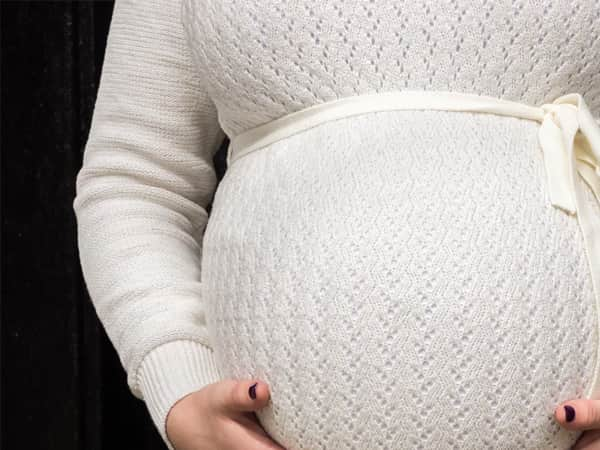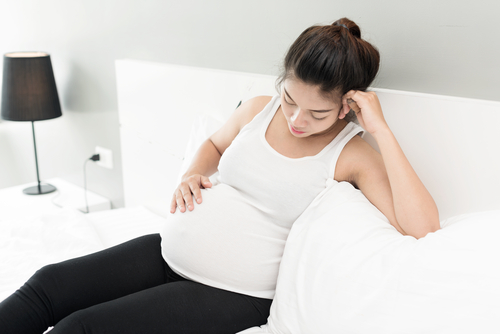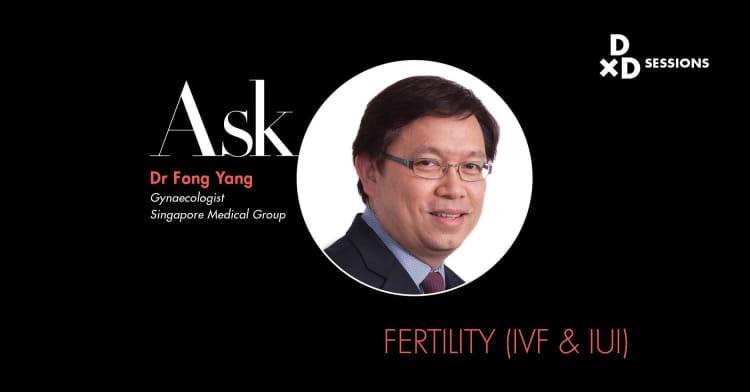Since the first In-Vitro Fertilization (IVF) baby was born in 1978, the science of fertility has been advancing at breakneck speed. It's revealing that "IVF Singapore" is one of the most searched terms every month.
This guide will explain all you need to know about IVF treatment in Singapore, as well as address the most frequent questions that patients who are trying to get pregnant ask me in clinic.
If you want to find out the costs of IVF in Singapore, you can check out this previous post.
What's the success rate of IVF treatment in Singapore?

For ladies between 35 – 40 years old, the pregnancy success rate of IVF may range from 35% to 60%.
This depends on underlying medical problems, and the specific labs involved.
Most labs will be happy to tell you their lab-specific pregnancy rates if you ask them.
The Ministry of Health also collects and tracks the results of all registered IVF labs in Singapore.
Why is Singapore's fertility falling every year?

The technology we have today to help couples conceive would have been science fiction to those of our parents’ generation. Why is it then, that despite this, Singapore’s fertility index is dismal and worsening year by year?
The most obvious reason I can see, in my last 18 to 20 years of fertility practice, is the late age at which ladies start conception.
The average age of 1st time mothers these days is around early to mid-30s, compared to the mid-20s when I started practicing gynaecology more than 20 years ago.
With age comes:
- Deterioration of the female reproductive system
- Poorer egg quality, and
- Fewer eggs being available for pregnancy
This is one aspect science has not been able to overcome effectively. To a lesser extent, the same holds true for older men.
The other issue many women have to overcome is the stigma of seeking help for fertility.
The social stigma of being "infertile” still cuts deep, and many couples hold back from seeking treatment early because they feel “we are still young, and we have not tried hard enough yet”.
When should you ask your gynae about your fertility?

I feel there is no need to be shy to ask your gynaecologist or GP about fertility the next time you go for your Pap smear or health screening.
As a gauge, if you are 35 years or older and have been trying for a baby for more than 6 months, you should seek specialist help.
The same applies if you are less than 35, but have been trying for a year or longer.
It's also common for patients to ask me about fertility enhancing treatments. Some popular examples include:
- Traditional medication
- Acupuncture
These alternative fertility treatments can be effective when used together with more mainstream fertility treatment. However, they will have to be tailored to your specific individual needs.
You should discuss these options with your fertility specialist, as he or she will need to take your specific condition into consideration.
Does IVF allow me to get pregnant at the first try?

Not every lady will need IVF from the start. Many a time, my patients are able to get pregnant rather easily once they understand their menstrual cycles, and know when's the best time to try.
Your gynaecologist (especially one who deals with fertility issues) will be able to pinpoint your fertile period via ultrasound scans, and tell you which day to start trying.
Sometimes we can even tell you which hour your ovulation will take place.
Of course, there are some basic checks and tests that will have to be performed before you come to this stage.
Timing is essential in fertility, and for Singaporeans who travel extensively for work, compromises will have to be made. Occasionally, last-minute changes to work schedules may be necessary.
I am sure these are small inconveniences in the bigger scheme of things; once your baby comes along, there will be even greater sacrifices and changes to be made by both you and your husband!
Also read: The Ultimate Guide to Traditional Chinese Medicine (TCM) Fertility Treatments in Singapore (2021)
Why doesn't Clomiphene work for everyone?

One of the most common methods in Singapore to help ladies conceive is to take a tablet called clomiphene.
This non-hormonal medication encourages the body to develop an egg.
I'm able to determine when this egg will mature by tracking the size of the follicle containing the egg with ultrasound scans.
At this stage, I would also suggest an injection to ensure that ovulation takes place on the right day and time, so that you can try intercourse without having to guess when.
Some of my patients also use mobile phone apps to help them pinpoint this day, but this does not work for all (even if you have very regular menses).
One thing to note is that clomiphene may not work for everyone, especially if you have a condition known as polycystic ovary disease (PCOS for short).
In such cases, we may discuss the use of additional oral medication such as metformin, or even injections to help with egg growth.
These are more specialized forms of fertility enhancing treatment, and you will need to discuss the details with your gynaecologist.
What is the pregnancy success rate of IUI in Singapore?

Your doctor may also bring up the option of intra-uterine insemination (IUI) to improve your chances of conception.
These techniques are not as difficult or complicated as you think! My advice is to keep your mind open to these techniques of helping you to conceive.
IUI, either via clomiphene or with injectables, will give you a pregnancy rate of between 12% - 20%. This depends on:
- The number of eggs produced in a cycle
- Your husband’s semen quality and sperm count
- Your age
Most ladies will get pregnant with three to four IUI attempts. However, if you do not, then subsequent IUI attempts may not further improve your pregnancy chances.
In such instances, I would encourage you to discuss IVF with your gynaecologist.
Who can go for IVF treatment in Singapore?

In Singapore, you have to fulfill two main criteria before you are allowed to undergo IVF:
- You have to be legally married
- You have to be 45 years old or younger
However, permission may be obtained from the Ministry of Health on a case-by-case basis if you have good valid reasons.
Also read: How is IVF performed in Singapore, and what should one know before going for IVF in Singapore?
What's your husband's role in IVF treatment?

IVF almost entirely involves treatment and procedures on the lady.
Your husband has little to do physically. He simply has to:
- Improve his semen count and quality before the actual IVF program
- Produce a sample of sperm on the day of egg retrieval
However, your husband’s role in providing moral support and emotional stability is very important, as the program is usually quite stressful for the both of you.
How does IVF treatment in Singapore work?

IVF involves a series of daily injections, which usually starts on your second day of menses. There will be ultrasound scans performed after one week of injections to assess the development of the eggs.
Sometimes, the injections and scans will continue for a few more days, until your eggs are mature.
There will then be one final trigger injection to ripen the eggs, followed by aspiration of the eggs 36 hours later.
This phase of egg aspiration is usually done in the IVF centre under anaesthesia, and involves a procedure quite similar to a vaginal ultrasound scan.
Also read: How painful is IVF, and what can be done to reduce the pain?
What happens to your harvested eggs during IVF treatment?

Once retrieved, the embryologists in the IVF lab will process the eggs, followed by fertilization of the eggs with your husband’s sperm.
Thereafter, these eggs will be cultured in the lab for three to five days in very controlled, sterile environments sealed off from the outside world in special incubators.
Some incubators have built in cameras that allow for continuous monitoring of these embryos. Though costly, these cameras are very useful in helping us decide which embryos are growing well to give a better chance of pregnancy.
In most cases, the embryos are frozen on the fifth day, and are replaced in the uterus after two or three months as “frozen embryo transfers”.
Studies and my personal experience show that such frozen transfers result in higher pregnancy rates.
Also read: How can I get the best results from IVF?
How is the embryo placed in your womb?
The embryo replacement procedure is a simpler process, and usually involves oral medication for 1.5 to 2 weeks, followed by vaginal medication to prepare your womb lining.
The actual replacement is done in the IVF lab, without any need for anaesthesia in most cases. This is very similar to a Pap smear.
After embryo replacement, you will be given two weeks of hospitalization leave to rest. There will be some blood tests during that period, and you will have a pregnancy test at the end of the two weeks.
Related: What are the risks of IVF to the mother in the short and long term?
How much does IVF cost in Singapore?

In Singapore, the total costs for one cycle of IVF treatment in private hospitals ranges from $12,000 to $20,000.
IVF costs in public hospitals range from about $10,000 - $15,000.
Singaporeans can also use Medisave to pay for part of the costs of IVF (both private and public labs).
You may also be eligible for further government subsidies of up to 75%, but only if you do your IVF in public hospitals.
Singapore Citizen (SC) Couple
SC-PR Couple
SC-Foreigner Couple
Fresh
75%; up to $7,700
55%; up to $5,700
35%; up to $3,600
Frozen
75%; up to $2,200
55%; up to $1,600
35%; up to $1,000
The downside, however, is that public hospitals tend to be oversubscribed, and you may have to wait for several months before it is your turn to start the program.
Due to the workload in public hospitals, you may also meet your doctor less frequently, and instead interact more with the IVF nurses.
Nonetheless, both private and public IVF labs in Singapore are well managed and have good results to show.
How much Medisave can you claim for your IVF treatment in Singapore?
Singaporeans or Permanent Residents can make Medisave withdrawals for IVF treatment.
The maximum withdrawal limits for individual treatment cycles are as follows:
- $6,000 for your first cycle
- $5,000 for your second cycle
- $4,000 for your third and subsequent cycles
There is a lifetime withdrawal cap limit of S$15,000.
To sum up, the most important points to remember in your journey are:
1. Start early when trying to get pregnant; medical technology cannot reverse the effects of aging
2. Keep an open mind, and do listen to what your gynaecologist suggests
3. Do not hesitate to use assisted reproductive techniques like IUI or IVF if your fertility specialist recommends them.
4. Discuss your concerns and fears with your doctor. He/she may be able explain the rationale for recommending a particular procedure.
Always remember, pregnancy is a long journey; conceiving early with a little help would be a great way to start off on that long road to motherhood!
Dr. Fong Yang, an accredited Ministry of Health IVF clinician, has been practicing Obstetrics and Gynaecology for the past 18 years. He is also one of the rare few IVF clinicians who treats both male and female infertility. He was the first in Singapore to perform percutaneous sperm aspiration for men with obstructive azoospermia - a condition whereby sperm cannot be produced due to obstruction of the sperm ducts.








